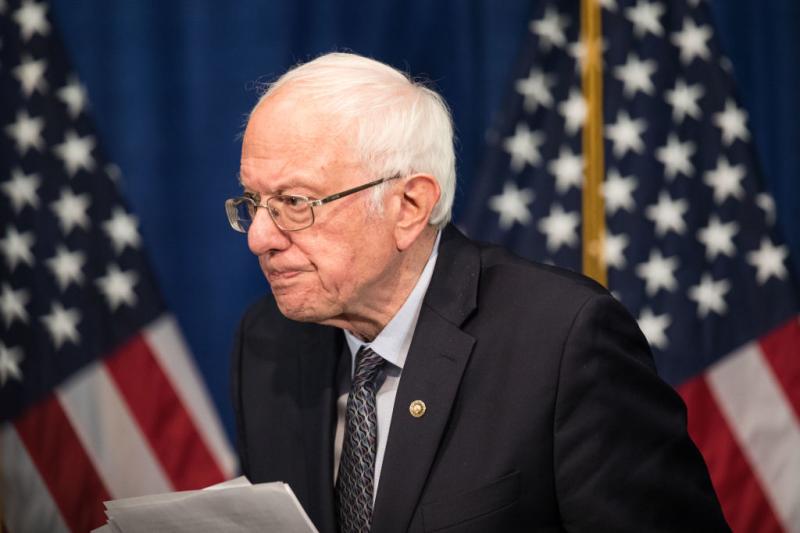Bernie Sanders Dropped Out of the Presidential Race—So Is Medicare For All Dead?
Category: Entirely New
Via: tig • 6 years ago • 0 commentsBy: Sanders, Warren and Representative Tulsi Gabbard (Newsweek)



Share U.S. Bernie Sanders Joe Biden Affordable Care Act Obamacare
Health care and the high cost of prescription drugs have consistently appeared as top concerns of voters in numerous polls, but Democratic voters across the country have largely rejected the candidates pushing for universal health care, or Medicare for All.
The signature policy proposal of former Democratic presidential candidate Senator Bernie Sanders of Vermont, who suspended his campaign on Wednesday, while appealing to many, does not appear to have resonated strongly enough with voters as the solution to address the perceived problems with the current health care status quo. Instead, many more voters backed candidates offering modest tweaks, namely expanding the Affordable Care Act, known commonly as Obamacare, and adding a public option for more Americans to gain access to Medicare.
Former Democratic contender Pete Buttigieg, the former mayor of South Bend, Indiana, dubbed his version of moderate health care reform, "Medicare for All who want it." Meanwhile, former Vice President Joe Biden, the presumptive presidential nominee for the Democratic party, put forward a comparable plan. In the end, these less dramatic adjustments to the health care system seem to have won the day.
While multiple Democratic candidates had backed Medicare for All, with slight variations, Sanders and Senator Elizabeth Warren of Massachusetts, who made universal health care a centerpiece of their campaigns, were the only two contenders to stay in the race until voting actually got underway. Warren, even before the Iowa caucuses on February 3, saw her campaign stumble as she struggled to address concerns from pundits and rivals about how she planned to pay for the ambitious policy. Although she appeared to be the progressive frontrunner last year, these persistent questions and concerns correlated with her declining polling numbers by the end of 2019.
Senator Bernie Sanders (i-Vermont) walks away from the podium after delivering a campaign update at the Hotel Vermont on March 11 in Burlington, Vermont Scott Eisen/Getty
In November, Democratic Representative Nancy Pelosi of California, the Speaker of the House and the top Democrat in Washington voiced her misgivings about Sanders' and Warren's health care plan.
Related Stories
"I'm not a big fan of Medicare for All," Pelosi told Bloomberg News in an interview. "I mean, I welcome the debate. I think that we should have health care for all."
"It is expensive," the leader of the House noted of Medicare for All. "There is a comfort level that some people have with their current private insurance that they have, and if that is to be phased out, let's talk about it, but let's not just have one bill that would do that," she argued.
Pelosi's caution appears to have resonated with Democratic voters.
Even when combining the delegates and votes won by Sanders, Warren and Representative Tulsi Gabbard of Hawaii (who backed Medicare for All with caveats that allowed for some private insurance) in the presidential race, those promoting more moderate health care reform won the day. In fact, combined together, the popular vote for candidates that backed Medicare for All was significantly lower in the Iowa caucus, the New Hampshire primary, the South Carolina primary, the Nevada caucus and on Super Tuesday. While moderates won more than 7.7 million votes, the progressives combined garnered just about 7.1 million in all the early contests.
On Super Tuesday II, this trend continued with the race narrowed to just Biden and Sanders. The former vice president garnered over 2 million votes, while the senator from Vermont won less than 1.5 million.
However, voters have—according to exit polls by CNN—overwhelmingly said they supported a government-run plan for all as opposed to private insurance. In fact, the majority of Democratic voters said they preferred the idea of a universal health care system in Iowa, New Hampshire, Nevada, Alabama, Arkansas, California, Colorado, Maine, Minnesota, North Carolina, Oklahoma, Tennessee Texas, Utah, Vermont, Virginia, Washington, Michigan, Missouri and Mississippi. In Massachusetts, 50 percent of voters backed a government-run plan over private insurance, and in South Carolina, a plurality of 49 percent supported the idea of universal health care.
But while those polls suggest that voters are more supportive of a Medicare for All plan, like the ones backed by Sanders, the Vermont senator only pulled off victories in six of those states. CNN did not have exit polling data for North Dakota, which Sanders also won.
A previous survey conducted by Harvard, The New York Times and the Commonwealth Fund may provide additional clues to this seeming disconnect. That polling, which was published at the beginning of November, showed that while most voters initially say they support a universal health care approach, many reveal more moderate preferences in follow-up questions.
Respondents were offered three options: Medicare for All, a proposal similar to that of Biden and another much more conservative plan proposed by Republicans, and split among the policies. About 30 percent backed each idea, or 32 percent, 28 percent and 29 percent respectively.
Whether the 2020 Democratic nomination contests will be the final referendum on Medicare for All remains to be seen. Progressives, including Sanders, have argued that the current coronavirus crisis reveals more clearly the need for drastic government reform of the health care system. However, Biden countered this argument in the most recent Democratic debate, noting that Italy's universal health care system had not prevented the virus' spread. He argued instead that immediate emergency action was required in a pandemic situation, not an entirely new health care system.
Democratic presidential candidate former Vice President Joe Biden participates in the 11th Democratic Party 2020 presidential debate in a CNN Washington Bureau studio in Washington, D.C. on March 15 MANDEL NGAN/AFP/Getty
But proponents of universal health care also believe the tide is changing, with more and more Americans backing a Medicare for All-style system.
"Medicare for All is inevitable. It is a matter of when, not if. That's because the current system, with private health insurers being the gatekeepers to care for millions of Americans, is collapsing," Wendell Potter, a former private health insurance executive who now advocates for major health care reform, told Newsweek. "The reason voters rank health care as their top issue and support Medicare for All is because they are feeling more and more financial distress."
Even though Sanders and Medicare for All candidates lost, the growing support for the Vermont senator's signature policy proposal is a marked change from the debate around health care when former Democratic President Barack Obama won in 2008. Back then, even moderate Democrats worked to counter his efforts to push through the Affordable Care Act. A proposed public option, which is now considered to be the moderate proposal, had to be dropped entirely in order for the legislation to move forward.
Potter sees the shift as a bad sign for the private insurance sector whether or not Medicare for All was a winning issue in this election cycle. "We will reach a tipping point soon when candidates and policymakers catch up with public opinion," he predicted.
